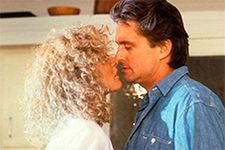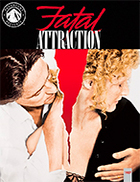Fatal Attraction
|  It was William Congreve who wrote in his first play, 1693’s The Old Bachelor, “Heav’n has no rage, like love to hatred turn’d, Nor Hell a fury, like a woman scorn’d.” That now-infamous line—turned into an axiom after nearly 330 years of repetition—may have derived from a comedy, but taken by itself, Congreve might as well have been writing about the premise of Adrian Lyne’s Fatal Attraction. Fatal Attraction was one of those rare films that became a true cultural phenomenon. Conceived of as a thriller about ordinary life turned upside down when a happily married man has a weekend fling with another woman who turns out to be psychotic, it struck a chord—actually, it struck many chords. Feminists understandably (but mistakenly) deplored the film because they read it as an indictment that all single working women were secretly closet basket cases ready to go over the edge if rejected by a man. And the hell was scared out of an entire generation of Reaganite husbands in yellow power ties who suddenly thought twice about sleeping around. Adultery never looked so unappealing. Michael Douglas stars as Dan Gallagher, the family man who secretly betrays his devoted wife, Beth (Anne Archer) and six-year-old daughter, Ellen (Ellen Hamilton Latzen), for a weekend affair with Alex Forest (Glenn Close), a woman he meets while doing legal work for a publishing company. Screenwriter James Dearden, working from an original concept he had developed as a short film for British TV, wastes no time setting up the scenario. It is a risky proposition, as the protagonist is shown engaging in a torrid affair 15 minutes into the film, made even riskier because, by all accounts, Dan has no reason to stray—he loves his wife and daughter and he is content in his life. Yet, as often happens, a situation presents itself, and he takes advantage of it, thinking it will be a short-lived excursion onto the wild side that he can safely leave behind. Of course, it doesn’t turn out to be short-lived because Alex refuses to leave it at that. Alex has understandably been thought of as a classic movie villain—the hysterical psychotic who inch by inch destroys Dan’s life with her increasingly frenzied determination to possess him. Yet, one of the reasons Fatal Attraction works as well as it does is because Glenn Close gives Alex an undeniable humanity. Throughout most of the film, she is not so much evil as she is sad—a desperately lonely human being who has likely suffered much in her life and refuses to accept Dan’s shoddy treatment of her. The tendency is to sympathize with Dan because that is what Hollywood movies have taught us to do; but, the truth is, he shows her no respect as a human being. Her approach is all wrong, but her points are painfully valid. Thus, we understand why she is so angry and vengeful, even if we can’t justify what she eventually does. Fatal Attraction also works because it is firmly rooted in the everyday. Director Adrian Lyne, then know for the music-video-inspired Flashdance (1983) and the steamy soft-core 9 1/2 Weeks (1986), is a visually flashy director, but he grounds the operatic ballyhoo of the story in a realistic mise-en-scene. For all the mistakes he makes, Dan is an ordinary, understandable man who generally wants to do the right thing, but finds himself in a situation (of his own making, mind you) that he has no way out of. At the same time, we also fully sympathize with Anne Archer’s character and the pain she eventually endures. Dan’s failure as a man is two-fold, as he betrays Beth and deserts Alex, and it is only due to the general likeableness of Michael Douglas as an actor and his sincere portrayal of a decent, but flawed man that makes him sympathetic. Interestingly, Fatal Attraction, despite all its doses of heavy-panting sex and bloody violence, is a deeply conservative film. As with the much-talked-about million-dollar-question premise of Indecent Proposal (1993), which Lyne would direct a few years later, it uses an extreme situation to underscore the importance of conventional morals and values—the sanctity of marriage, the dangers of temptation, and the power of forgiveness. Of course, Fatal Attraction is, in the end, a thriller, and Lyne generates solid suspense in a number of scenes and springs a few genuine surprises, most notably the now-infamous rabbit-boiling scene that some people still find literally unwatchable. As the film winds to its climax, it begins to lose some of its grip as it becomes more and more formulaic and Alex becomes less a character than a two-dimensional monster. Once she has a butcher knife firmly in hand, we can be sure that any depth and complexity will be tossed in favor of slasher-style histrionics and an audience-dictated ending that puts everything right in place according to Hollywood formula. If Fatal Attraction ultimately comes up short in the end (a much more challenging and thought-provoking ending was scrapped when it tested poorly with audiences), it still ranks as something of a modern classic, if only for its keen ability to tap into the zeitgeist of the moment and throttle audiences with it.
Copyright © 2020 James Kendrick Thoughts? E-mail James Kendrick All images copyright © Paramount Home Entertainment | |||||||||||||||||||||||||||||||
Overall Rating: 

 (3)
(3)


